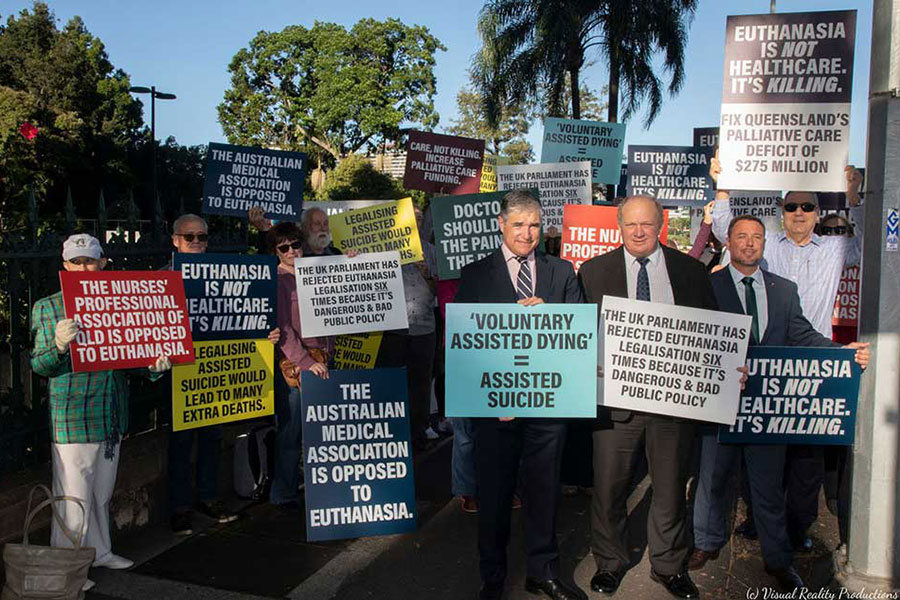
PASSAGE OF VOLUNTARY ASSISTED DYING ACT 2021
On Thursday 16th September 2021, the Queensland Labor Government passed legislation which legalised both assisted suicide and voluntary euthanasia. The legislation is entitled the “Voluntary Assisted Dying Act 2021” and will take effect on 1st January 2023.
The passage of this Act represents a parting of the ways in Queensland from a medical system that strove to support the dying but did not attempt to pre-empt the natural event of dying to one that facilitates the taking of life by the patient him/herself or by involving a medical practitioner or nursing practitioner to perform the action. Not only does the state permit its citizens to take their own lives, it is also dangerous because it can lead to wrongful deaths by several ways. It can involve people who would have wrongfully accessed assisted suicide because of a wrong diagnosis, a wrong prognosis, or suffer coercion, elder abuse, untreated mental anguish, or because they had little or no access to palliative care specialists and felt they had no other choice.
There are also grave concerns that there will be an increase in non-assisted suicide rates because of a suicide cognation effect that often accompanies euthanasia or assisted suicide being legalised.
Aspects of the Act include:
- Queenslanders with a 12 month prognosis who are over 18 years old would be eligible for euthanasia or assisted suicide, upon the approval of two doctors who don’t have to be specialists. Nor is there a requirement for the patient to be examined by a specialist at any stage of their illness.
- The two approving doctors can be junior General Practitioners with little or no specialised training in end-of-life management. (Palliative care specialists train for at least four years full-time after graduating with a medical degree.)
- Doctors with a conscientious objection to euthanasia or assisted suicide would be forced to refer patients for it, and therefore be complicit in the outcome of a patient killed.
- Health institutions whose charter is opposed to euthanasia (e.g. Catholic Health Australia and UnitingCare as well as many others) would be compelled to refer patients who qualify for euthanasia or assisted suicide upon request. In the case where the patient is a permanent resident of a facility, like an aged care home for example, the institution would be forced to let the assisted suicide or euthanasia take place on the premises by an outside doctor coming in to kill the patient or the poison being delivered to the facility.
- No mental health checks. There is no requirement for those requesting assisted suicide to be assessed by a mental health expert like a psychiatrist, yet mental anguish and depression is often one of the main drivers for requests for euthanasia, as data from other jurisdictions shows.
- No requirement to be seen by a specialist in the area of the patient’s suffering, e.g. an oncologist for cancer patients.
- No requirement for a patient to be seen by a palliative care specialist.
- Inequitable access to euthanasia and palliative care. If passed, this law would allow people with a 12 month prognosis to access euthanasia straight away, but they may not be able to access palliative care until a few weeks or a few months before the end of life (and in some cases in regional Queensland they may have no access to palliative care at all). Very concerningly, when Western Australia passed its assisted suicide legislation, an amendment to the Bill which would have given regional WA the same access to palliative care as assisted suicide was voted down.
- The deceptive language in the Bill – even the term “voluntary assisted dying” makes it sound like people are accessing palliative care when in fact it is euthanasia or assisted suicide.
- The Bill allows people with a prognosis of 12 months to access assisted suicide. In other Australian jurisdictions the legislation stipulates a six month prognosis, so it allows access six months earlier than all other assisted suicide legislation in Australia.
- Trying to talk someone out of assisted suicide could put you in jail for up to 7 years.
- Death certificates would be falsified for people who access assisted suicide to record their underlying sickness as the cause of death instead of suicide or euthanasia.
- A doctor or a nurse can raise the idea of assisted suicide in the context of discussing other end-of-life options. This is incredibly dangerous, as a patient would no doubt be feeling unwell, distressed by their prognosis and very vulnerable.
- It legalises both assisted suicide, where the doctor prescribes poison for the patient to take, and euthanasia, where the doctor administers a lethal injection to kill the patient either via syringe or a drip.
Additional considerations are:
- Queensland has a woeful palliative care funding deficit to the tune of about $250 million per year according to Palliative Care Queensland. This is despite many calls for substantial increases to palliative care funding from the Australian Medical Association, Catholic Health Australia (the largest provider of health care after the government) and Cherish Life through our parliamentary petition to the Queensland Government (thank you those who signed, we achieved almost 8,000 signatures!). The palliative care deficit is most felt in regional Queensland where some areas have no palliative care services at all.
- Queensland Health only has 134 dedicated palliative beds.
- Queensland already has almost the highest suicide rate in Australia. In Victoria, in the year after assisted suicide was legalised, the non-assisted suicide rate increased by 13%, and in Canada since euthanasia was legalised in 2016, the total number of suicides (both assisted suicide and non-assisted suicide) increased by 400% over just four years. The Netherlands has recorded an increase in non-assisted suicides of 10% since it legalised euthanasia in 2008.
- The Australian Medical Association, Nurses Professional Association of Queensland, and 107 out of 109 national medical bodies are opposed to euthanasia of any kind.
